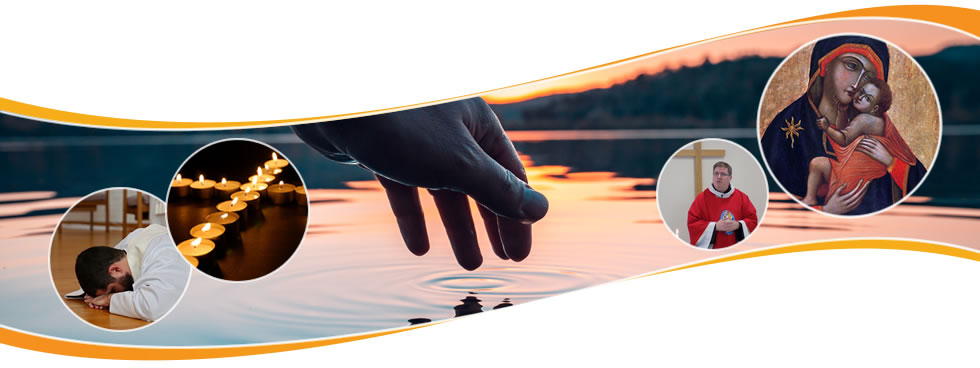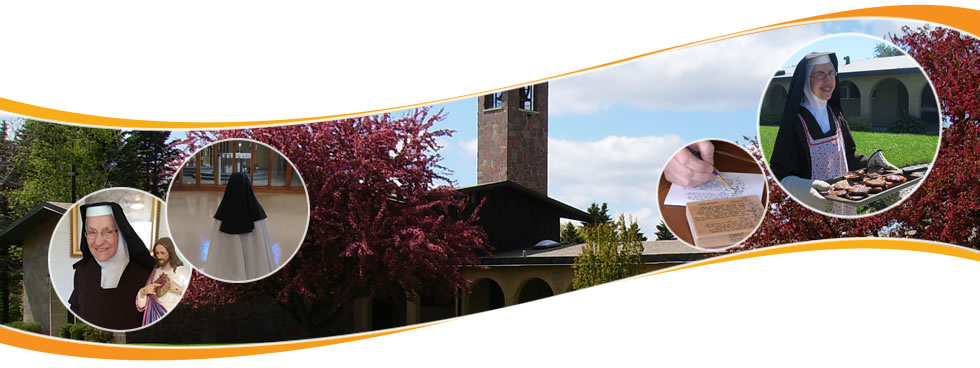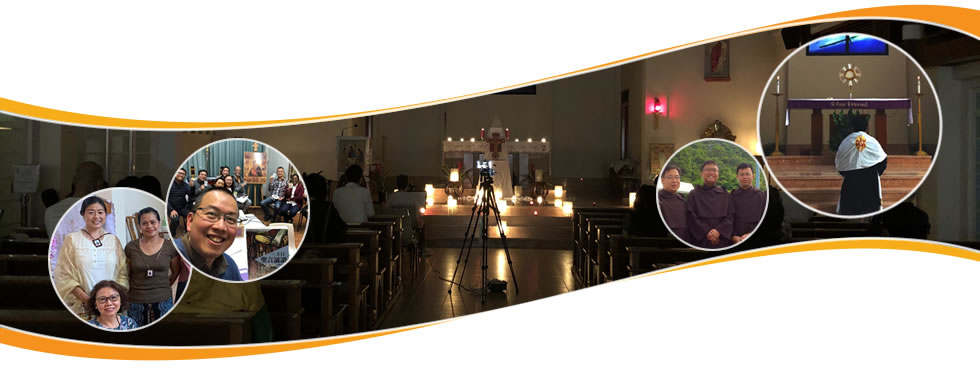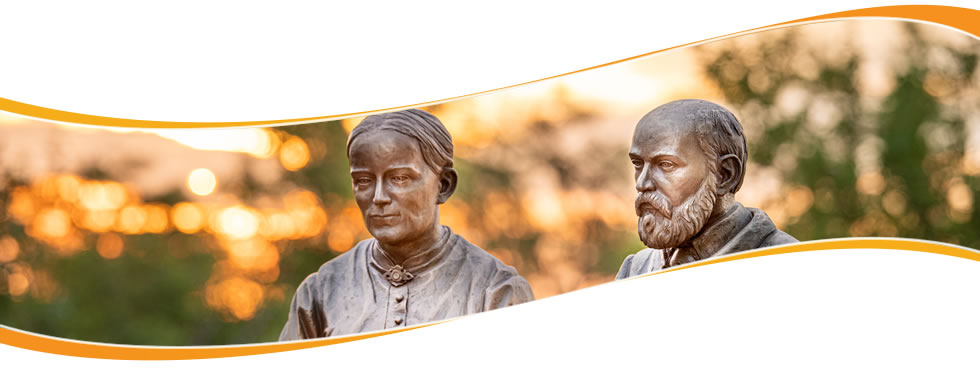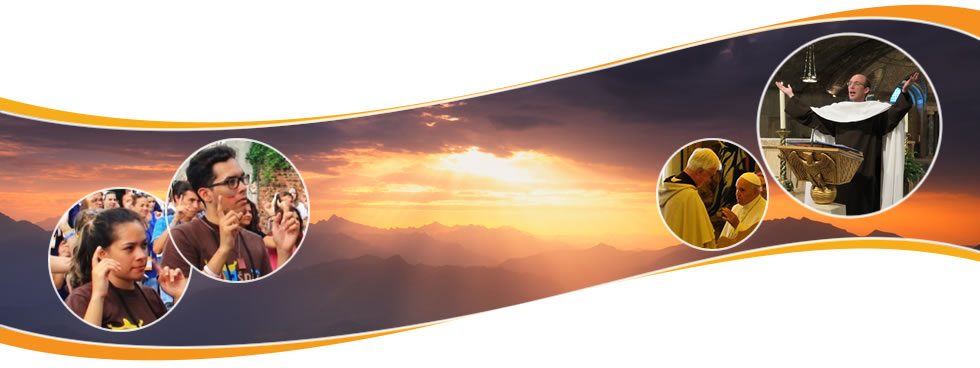Lectio Divina: John 1:43-51
Christmas Time
1) Opening prayer
All-powerful and ever-living God,
You give us a new vision of Your glory
in the coming of Christ Your Son.
He was born of the Virgin Mary
and came to share our life.
May we come to share His eternal life
in the glory of Your kingdom,
where He lives and reigns with You and the Holy Spirit,
one God, for ever and ever. Amen.
2) Gospel Reading - John 1:43-51
Jesus decided to go to Galilee, and he found Philip. And Jesus said to him, "Follow me." Now Philip was from Bethsaida, the town of Andrew and Peter. Philip found Nathanael and told him, "We have found the one about whom Moses wrote in the law, and also the prophets, Jesus, son of Joseph, from Nazareth." But Nathanael said to him, "Can anything good come from Nazareth?" Philip said to him, "Come and see." Jesus saw Nathanael coming toward him and said of him, "Here is a true child of Israel. There is no duplicity in him." Nathanael said to him, "How do you know me?" Jesus answered and said to him, "Before Philip called you, I saw you under the fig tree." Nathanael answered him, "Rabbi, you are the Son of God; you are the King of Israel." Jesus answered and said to him, "Do you believe because I told you that I saw you under the fig tree? You will see greater things than this." And he said to him, "Amen, amen, I say to you, you will see the sky opened and the angels of God ascending and descending on the Son of Man."
3) Reflection
• Jesus returned to Galilee. He met Philip and called him by telling him: “Follow Me!” The purpose of the call is always the same: “to follow Jesus”. The first Christians sought to preserve the names of the first disciples and of some of them they even kept as their family names and the names of their places of origin. Philip, Andrew and Peter were from Bethsaida (Jn 1:44). Nathanael was from Cana. Today, many forget the names of the people who were at the start of their communities. Remembering the names is a way of preserving identity.
• Philip meets Nathanael and speaks to him about Jesus: “We have found Him of whom Moses in the Law and the Prophets wrote, Jesus, son of Joseph from Nazareth”. Jesus is the one to whom all the history of the Old Testament refers.
• Nathanael asks: “From Nazareth? Can anything good come from that place?” Probably, even in his question, there shows a rivalry which existed among the small villages of the same region: Cana and Nazareth. According to the official teaching of the scribes, the Messiah would come from Bethlehem, in Judah. He would not come from Nazareth in Galilee (Jn 7:41-42). Philip gives the same answer which Jesus gave to the other two disciples: “Come and see for yourself!” It is not by imposing, but by seeing that people are convinced. Once again the same way: to meet, to experience, to share, to witness, to lead toward Jesus!
• Jesus sees Nathanael and says: “Truly, he is an Israelite in whom there is no deception”. And He affirms that He already knew him when he was under the fig tree. How could Nathanael be an “authentic or true Israelite” if he did not accept Jesus as the Messiah? Nathanael “was under the fig tree”. The fig tree was the symbol of Israel (cf. Mi 4:4; Zc 3:10; 1 Kg 5:5). An authentic Israelite is one who knows how to detach himself from his own ideas when he sees that they are not in agreement with God’s plan. The Israelite who is not ready for this conversion is neither authentic nor honest. Nathanael is authentic. He was waiting for the Messiah according to the official teaching of the time (Jn 7:41-42,52). This is why, at the beginning, he did not accept a Messiah coming from Nazareth. But the encounter with Jesus helped him to understand that God’s plan is not always as people imagine or desire it to be. He recognizes and acknowledges his mistake, he changes his idea, and he accepts God as Messiah and confesses: “Rabbi, You are the Son of God: You are the King of Israel!” The confession of Nathanael is only the beginning: The one who will be faithful will see heaven open and the angels of God ascending and descending over the Son of man. He will experience that Jesus is the new bond between God and human beings. It is the dream of Jacob which has become a reality (Gen 28:10-22).
4) Personal questions
• Which title for Jesus pleases you the most? Why?
• Have you had an intermediary that brought you to Jesus?
5) Concluding prayer
For Yahweh is good,
His faithful love is everlasting,
His constancy from age to age. (Ps 100:5)
Lectio Divina: 2nd Sunday after Christmas
Click here if your Country celebrate the feast of the Epiphany today
John 1,1-18
The words of a Canticle of the Community
1. Opening prayer
Create in us silence so that we may listen to your voice in Creation and in the Scriptures, in events and in people, above all in the poor and suffering. May your word guide us so that we too, like the two disciples from Emmaus, may experience the force of your resurrection and witness to others that you are alive in our midst as source of fraternity, justice and peace. We ask this of you, Jesus, son of Mary, who revealed to us the Father and sent us your Spirit. Amen.
2. Reading
During the reading of the Prologue of the Gospel of John it is well to activate our own memory and try to remember some canticle or poem on Jesus, of the time of our childhood, which has marked our life.
1,6-8: John the Baptist was not the Light
1,9-11: His own did not recognize him
1,12-13: Those who receive him become children of God
1,14: The Word became flesh
1,15-17: Moses give the Law, Jesus gives Grace and Truth
1,18: It is like the rain that washes.
3. A moment of prayerful silence
4. Some questions
ii) Which are the images used by John in this poem to say who Jesus was for the community?
iii) Which is the new thing that the poem of John makes me discover in myself?
iv) The poem of John says. “He came to his own and his own people did not accept him!” (Jn 1, 11). What does this sentence mean? How does this happen today?
v) Which are the facts or events or persons of the Old Testament which are recalled in the Prologue?
5. For those who wish to deepen more into the text
The Prologue helps one to understand why the Fourth Gospel is so diverse from the other Gospels. In the Prologue, John presents the vision that he has of Jesus, Word of God, and describes the route of the Word. The Word was with God from the beginning of creation and by it everything was created. Everything which exists is an expression of the Word of God. Even being present in everything, the Word has wanted to place himself even closer to us and because of this he became flesh in Jesus, and lived among us, he carried out his mission and has returned to the Father. Jesus is the living Word of God. In everything that he says and does he reveals the Father: “Anyone who has seen me has seen the Father!” (Jn 14,9). He and the Father “The Father and I are one” (Jn 10, 30).
In saying: “In the beginning was the Word”, John makes us think in the first sentence of the Bible which says: “In the beginning God created Heaven and earth” (Gn 1, 1). God created by his Word. “The moment he spoke, it was so, no sooner had he commanded, than there it stood” (Ps 33, 9; Ps 148, 5). All creatures are an expression of the Word of God. Here, from the beginning, we have the first sign of ecumenical and ecological openness of the Fourth Gospel.
The Prologue says that the universal presence of God’s Word is life and light for every human being. But the majority of persons do not perceive the Good News of the luminous presence of the Word of God in their lives. The living Word of God, present in all things, shines in the darkness, but the darkness could not overpower it.
John the Baptist comes to help people to discover this luminous and consoling presence of the Word of God in life. The witness of John the Baptist was so important, that up to the end of the first century, at the time that the Fourth Gospel was written, there were still persons who believed that he, John, was the Messiah! (Ac 19,3; Jo 1,20).
For this reason, the Prologue clarifies things saying: “John was not the light! He came to bear witness to the light!”
Just as God’s Word manifests itself in nature, in creation, in the same way also, it manifests itself in the “world”, that is in the history of humanity, and particularly, in the history of the people of God. When he speaks about world, John wants to indicate a system, that of the empire as well as of the religion of the time, systems closed up in themselves and therefore, incapable to know and to receive the luminous presence of the Word of God. The “world” did not recognize, did not accept the Word. From the time of Abraham and of Moses, the Word “came for his own, but his own did not recognize him”.
But the persons who opened themselves accepting the Word, became children of God. The person becomes a son or daughter of God not by own merit, but by the simple fact of trusting and of believing that God, in his goodness, accepts us and welcomes us. The Word enters into the person and makes her/him feel accepted by God as daughter, as son. This is the power of God’s grace.
God does not want to be far away from us. For this reason his Word gets close to us and becomes present in our midst in the person of Jesus. The Prologue literally says: “The Word became flesh and placed his tent in the midst of his people. Now the tent where God dwells with us is Jesus “full of grace and truth!” Jesus comes to reveal who is this God who is present in everything, from the beginning of creation.
These verses render the witness of John the Baptist. John began his proclamation before Jesus, but Jesus existed before him. Jesus is the Word which was already with God even before creation. Moses, in giving us the Law, manifested God’s will. Jesus gives us the fullness of grace and of truth which help us to understand and to observe the Law.
This last verse summarizes everything. It recalls the prophecy of Isaiah, according to which the Word of God is like rain which comes from heaven and does not return without having carried out its mission on earth (Is 55, 10-11). The way of the Word of God is like that. It comes from God and descends among us in the Person of Jesus. Through the obedience of Jesus he carried out his mission here on earth. At the hour of his death, Jesus gives up his Spirit and returns to the Father (Jn 19, 30).
He fulfilled the mission which he had received.
6. Prayer: Psalm 19 (18)
day discourses of it to day,
No utterance at all, no speech,
but from the entire earth the design stands out,
who comes forth from his pavilion like a bridegroom,
Rising on the one horizon he runs his circuit to the other,
The Law of Yahweh is perfect,
The precepts of Yahweh are honest,
The fear of Yahweh is pure, lasting for ever;
more desirable than gold, even than the finest gold;
Thus your servant is formed by them;
But who can detect his own failings?
And from pride preserve your servant,
May the words of my mouth always find favour,
7. Final Prayer
Lectio Divina: John 1:19-28
Christmas Time
1) Opening prayer
All-powerful Father,
You sent Your son Jesus Christ
to bring the new light of salvation to the world.
May He enlighten us with His radiance,
who lives and reigns with You and the Holy Spirit,
one God, for ever and ever. Amen.
2) Gospel Reading - John 1:19-28
This is the testimony of John. When the Jews from Jerusalem sent priests and Levites to him to ask him, "Who are you?" He admitted and did not deny it, but admitted, "I am not the Christ." So they asked him, "What are you then? Are you Elijah?" And he said, "I am not." "Are you the Prophet?" He answered, "No." So they said to him, "Who are you, so we can give an answer to those who sent us? What do you have to say for yourself?" He said: "I am the voice of one crying out in the desert, 'Make straight the way of the Lord,' as Isaiah the prophet said." Some Pharisees were also sent. They asked him, "Why then do you baptize if you are not the Christ or Elijah or the Prophet?" John answered them, "I baptize with water; but there is one among you whom you do not recognize, the one who is coming after me, whose sandal strap I am not worthy to untie." This happened in Bethany across the Jordan, where John was baptizing.
3) Reflection
• Today’s Gospel speaks about the witness of John the Baptist. The Jews sent “priests and Levites” to question him. In the same way, some years later, they sent people to control the activity of Jesus (Mk 3:22). There is a resemblance between the response of the people regarding Jesus and the questions which authorities address to John. Jesus asks the disciples: Whom do people say that I am?” They answered: “Elijah, John the Baptist, Jeremiah, one of the Prophets” (cf. Mk 8:27-28). The authorities address the same questions to Jesus: Are You the Messiah, or Elijah, the Prophet?” John responds by quoting the prophet Isaiah: “I am a voice of one who cries in the desert: Prepare a way for the Lord”. The other three Gospels contain the same affirmation concerning John: he is not the Messiah, but he has come to prepare the coming of the Messiah (cf. Mk 1:3; Mt 3:3; Lk 3:4). The four Gospels give great attention to the activity and the witness of John the Baptist. Why do they insist so much in saying that John is not the Messiah?
• John the Baptist was put to death by Herod around the year 30. But up to the end of the first century, the time when the Fourth Gospel was written, John continued to be considered a leader among the Jews. After his death, the memory of John continued to have a strong influence in the living out of the faith of the people. He was considered a prophet (Mk 11:32). He was the first great prophet who appeared after centuries without prophets. Many considered him the Messiah. In the year 50 Paul passed through Ephesus, in Asia Minor, and found a group of people who had been baptized with the baptism of John (cf. Acts 19:1-4). Because of this, it was important to spread the witness of John the Baptist himself, saying that he was not the Messiah, and instead proclaim Jesus as the Messiah. John himself contributed to radiate better the Good News of Jesus.
• “How is it that you baptize if you are neither the Messiah, nor Elijah, nor the prophet? The John's response is another affirmation in which he shows that Jesus is the Messiah: “ I baptize with water, but standing among you, unknown to you, is one who is coming after me; and I am not fit to undo the strap of His sandal”. Further ahead (Jn 1:33) John refers to the prophecies which announced the coming of the Spirit in the Messianic times: “The one on whom you will see the Spirit descend and rest upon Him, is the one who is to baptize with the Holy Spirit” (cf. Is 11:1-9; Ez 36:25-27; Joel 3:1-2).
4) Personal questions
• Have you had someone like John the Baptist who has prepared the way for you to receive Jesus?
• John was humble. He did not try to make himself greater than what he was in announcing Jesus. Have you been that way for someone in your life?
5) Concluding prayer
The whole wide world
has seen the saving power of our God.
Acclaim Yahweh, all the earth,
burst into shouts of joy! (Ps 98:3-4)
Lectio Divina: Solemnity of the Mother of God
Visit of the Shepherds to Jesus and His Mother
The marginalized are God’s favorites
Luke 2:16-21
1. Opening prayer
Lord Jesus, send Your Spirit to help us read the Scriptures the same way that You read them to the disciples on the way to Emmaus. In the light of the Word, written in the Bible, You helped them to discover the presence of God in the disturbing events of Your sentence and death. Thus, the cross that seemed to be the end of all hope became for them the source of life and of resurrection.
Create silence in us so that we may listen to Your voice in Creation and in the scriptures, in events and in people, and above all in the poor and suffering. May Your word guide us so that we too, like the two disciples on the way to Emmaus, may experience the force of Your resurrection and witness to others that You are alive in our midst as a source of fraternity, justice and peace. We ask this of You, Jesus, son of Mary, who revealed to us the Father and sent us Your Spirit. Amen.
2. Reading
a) A key to the reading:

The reason for Joseph and Mary to go to Bethlehem was the census imposed by Rome’s emperor (Lk 2:1-7). Periodically, the Roman authorities decreed these censuses in the various regions of their immense empire. It was a matter of registering people and knowing how many had to pay taxes. The rich paid taxes on land and goods. The poor paid for the number of children they had.
In Luke’s Gospel we note a significant difference between the birth of Jesus and that of John the Baptist. John is born at home, in his land, in the midst of parents and neighbors and is welcomed by all (Lk 1:57-58). Jesus is born unknown, away from His surroundings of family and neighbors and far from His land. “There was no room in the inn.” He had to be left in a manger (Lk 2:7).
Let us try to put our text (Lk 2:16-21) into the wider context of the visit of the shepherds (Lk 2:8-21). As we read, let us try to pay attention to the surprises we find and the contrasts that appear in this text.
b) A division of the text to help us in our reading:
Luke 2:8-9: The shepherds in the field, the first persons invited
Luke 2:10-12: The first announcement of the Good News is made to the shepherds
Luke 2:13-14: The praise of the angels
Luke 2:15-18: The shepherds go to Bethlehem and tell of their vision of the angels
Luke 2:19-20: Mary’s attitude and that of the shepherds concerning these events
Luke 2:21: The circumcision of the child Jesus
c) Text:
In the countryside close by there were shepherds out in the fields keeping guard over their sheep during the watches of the night. An angel of the Lord stood over them and the glory of the Lord shone round them. They were terrified, but the angel said, 'Do not be afraid. Look, I bring you news of great joy, a joy to be shared by the whole people. Today in the town of David a Savior has been born to you; He is Christ the Lord. And here is a sign for you: you will find a baby wrapped in swaddling clothes and lying in a manger.' And all at once with the angel there was a great throng of the hosts of heaven, praising God with the words, ‘Glory to God in the highest heaven, and on earth peace for those He favors.’ Now it happened that when the angels had gone from them into heaven, the shepherds said to one another, 'Let us go to Bethlehem and see this event which the Lord has made known to us.' So they hurried away and found Mary and Joseph, and the baby lying in the manger. When they saw the child they repeated what they had been told about Him, and everyone who heard it was astonished at what the shepherds said to them. As for Mary, she treasured all these things and pondered them in her heart. And the shepherds went back glorifying and praising God for all they had heard and seen, just as they had been told. When the eighth day came and the child was to be circumcised, they gave Him the name Jesus, the name the angel had given Him before His conception.
3. A moment of prayerful silence
so that the Word of God may penetrate and enlighten our life.
4. Some questions
to help us in our personal reflection.
a) What did you like best in this text? Why?
b) What surprises and contrasts do you find in this text?
c) How does the text teach us that the little ones are great in heaven and the poorest on earth?
d) What is Mary’s attitude and that of the shepherds concerning the mystery of God just revealed to them?
e) What is the message Luke wants to communicate to us through these details?
5. For those who wish to go deeper into the theme
a) The context of then and of today:
The text of the feast of the Mother of God (Lk 2:16-21) is part of the broader description of the birth of Jesus (Lk 2:1-7) and the visit of the shepherds (Lk 2:8-21). The angel had announced the birth of the savior and gave a sign of recognition: “You will find a baby wrapped in swaddling clothes and lying in a manger!” They were expecting the savior of a whole people and they were to recognize Him in a newborn child, poor, who lies close to two animals! What a great surprise!
God’s plan is fulfilled in an unexpected way, full of surprise. This happens today too. A poor child is the savior of the people! Can you believe this?
b) A commentary on the text:
Luke 2:8-9: The first invited people.
The shepherds were marginalized people and not appreciated. They lived together with the animals, separate from the rest of humanity. Because of their constant contact with animals, they were considered impure. No one would have ever invited them to visit a newly born baby. This is why the Angel of the Lord appears to pass on the great news of the birth of Jesus to them. Seeing the vision of the angels, they are full of fear.
Luke 2:10-12: The first announcement of the Good News
Luke 2:13-14: The praise of the angels: Glory to God in the highest heaven, and on earth peace for those He favors.
A multitude of angels appears descending from heaven. It is heaven that bends itself towards the earth. The parts of this verse summarize God’s plan. The first part tells us what happens in the world up there: Glory to God in the highest heaven. The second part tells us what will happen in the world here below: On earth peace for those He favors! If people could experience what it means to be favored by God, everything would be different and peace would dwell on earth. And this would be to the greater glory of God who dwells in the highest!
Luke 2:15-18: The shepherds go to Bethlehem and tell of their vision of the angels.
The Word of God is no longer a sound produced by the mouth. It is an event! The shepherds literally say, “Let us go to Bethlehem and see this event which the Lord has made known to us”. In Hebrew, the expression DABAR means word or talk. The word of God is a creative force. It fulfills what it says. At creation God said, “Let there be light, and there was light!” (Gen 1:3). The word of the angel to the shepherds is the event of the birth of Jesus.
Luke 2:19-20: Mary’s attitude and that of the shepherds concerning these events
Luke immediately adds that, "Mary treasured all these things and pondered them in her heart". These are two ways of hearing and welcoming the Word of God: (i) The shepherds get up to see the events and verify the sign given by the angel, and then they go back to their flocks glorifying and praising God for all that they had seen and heard; (ii) Mary, on the other hand, carefully keeps all these events in her mind and meditates on them in her heart. To meditate on things in one’s heart means to reflect on them in the light of the Word of God, to understand their full significance.
Luke 2:21: The circumcision and Name of Jesus.
According to the norms of the law, the child Jesus is circumcised on the eighth day after His birth (cf. Gen 17:12). Circumcision was a sign of belonging to the people. It gave the person an identity. On this occasion each child received his name (cf. Lk 1:59-63). He receives the name of Jesus that had been given Him by the angel before His conception. The angel had said to Joseph that the name of the child had to be Jesus, as “He is the one who is to save His people from their sins” (Mt 1:21). The name of Jesus is the transliteration of the name “Yeshua”, or Joshua, and means Yahweh saves. Another name that will gradually be given to Jesus is Christ, which means Anointed or Messiah. Jesus is the awaited Messiah. A third name is that of Emmanuel, which means God with us (Mt 1:23).
c) Further information:
Mary in Luke’s Gospel
i) The role of the first two chapters of Luke’s Gospel:
These are two rather well known but less understood chapters. Luke writes them in imitation of the Old Testament. It is as though these two chapters were the last of the Old Testament so as to open the door for the coming of the New Testament. In these chapters, Luke creates an atmosphere of softness and praise. From beginning to end the mercy of God is sung: God, who comes to fulfill His promises. Luke shows us how Jesus fulfills the Old Testament and begins the New Testament. And He does so in favor of the poor, the anawim, who knew how to wait for His coming: Elisabeth, Zachary, Mary, Joseph, Simeon, Anna and the shepherds. That is why the first two chapters are history but not in the sense that we give to history today. They were more like a mirror for the Christians converted from paganism. They could discover who Jesus was and how He had come to fulfill the prophecies of the Old Testament, satisfying the deepest aspirations of the human heart. These chapters were also a mirror of the events that were taking place within the communities in Luke’s time. The communities originating from paganism will be born from the communities of converted Jews. But these were different. The New did not correspond to what the Old Testament imagined and expected. It was "the sign of contradiction" (Lk 2:34), and caused tensions and was the source of much suffering. In Mary’s reaction, Luke presents a model of how the communities could react to and persevere in the New.
ii) A key to the reading:
In these two chapters Luke presents Mary as a model for the life of the community. The key is given to us in the episode where the woman in the crowd praises the mother of Jesus. Jesus modifies the praise and says: “More blessed still are those who hear the word of God and keep it!” (Lk 11:27-28). Herein lies the greatness of Mary. It is in the world where Mary knows how to relate to the Word of God that the communities contemplate. The better way of relating to the Word of God: welcoming it, incarnating it, living it, deepening it, reflecting on it, giving it birth and making it grow, allowing oneself to be overpowered by it even when one does not understand it or when one suffers because of it. This is the vision underlying the texts of chapters 1 and 2 of Luke’s Gospel, which speak of Mary, the mother of Jesus.
iii) An application of the key to the texts:
1. Luke 1:26-38: The Annunciation: "Let it happen to me as you have said!"
Opening oneself so that the Word of God may be welcomed and incarnated.
2. Luke 1:39-45: The Visitation: "Blessed is she who believed!"
Recognizing the Word of God in the events of life.
3. Luke 1:46-56: The Magnificat: “The Almighty has done great things for me!”
A resistance hymn of hope.
4. Luke 2:1-20: The Birth: "She treasured all these things and pondered them in her heart.”
The marginalized welcome the Word.
5. Luke 2:21-32: The Presentation: "My eyes have seen the salvation!"
God's promise is fulfilled.
6. Luke 2:33-38: Simeon and Anna: "A sword will pierce your soul"
Being a Christian means being a sign of contradiction.
7. Luke 2:39-52: At twelve years: "Did you not know that I must be in My Father's house?"
They did not understand the Word of God addressed to them!
iv) The contrasts that stand out in our text:
1. In the darkness of the night a light shines (2:8-9).
2. The world up there, heaven, seems to embrace our world here below (2:13).
3. The greatness of God manifests itself in the weakness of a child (2:7).
4. The glory of God is made present in a manger, close to animals (2:16).
5. Fear generated by the sudden apparition of an angel is changed into joy (2:9-10).
6. Those completely marginalized are the first to be invited (2:8).
7. The shepherds recognize God present in a child (2:20).
6. Praying with the Psalm 23 (22)
“Yahweh is my shepherd!”
Yahweh is my shepherd,
I lack nothing.
In grassy meadows He lets me lie.
By tranquil streams He leads me
to restore my spirit.
He guides me in paths of saving justice as befits His name.
Even were I to walk in a ravine as dark as death
I should fear no danger,
for You are at my side.
Your staff and Your crook are there to soothe me.
You prepare a table for me under the eyes of my enemies;
You anoint my head with oil;
my cup brims over.
Kindness and faithful love pursue me every day of my life.
I make my home in the house of Yahweh for all time to come.
7. Final Prayer
Lord Jesus, we thank for the word that has enabled us to understand better the will of the Father. May Your Spirit enlighten our actions and grant us the strength to practice what Your Word has revealed to us. May we, like Mary, Your mother, not only listen to but also practice the Word, You who live and reign with the Father in the unity of the Holy Spirit forever and ever. Amen.
The first thing the angel says is, “Do not be afraid!” The second is Joy to be shared by the whole people! The third is Today! Then the angel gives three names to indicate who Jesus is: savior, Christ and Lord! Savior is the one who frees all people from all ties! The authorities in those days liked to use the title savior. They attributed the title of Soter (Greek) to themselves. Christ means anointed or messiah. In the Old Testament this was the title given to kings and prophets. It was also the title of the future messiah who would fulfill the promises made by God to His people. This means that the newly born child, who lies in a manger, has come to fulfill the hopes of the people. Lord was the name given to God Himself! Here we have the three greatest titles imaginable. From this announcement of the birth of Jesus as savior, Christ and Lord, can you imagine anyone with a higher standing? If an angel says to you, “Be careful! I give you this sign of recognition: you will meet a child in a manger, in the midst of poor people!” Would you believe him? God’s ways are not our ways!
Who are the Carmelites?
The Carmelites— more formally known as The Brothers of the Blessed Virgin Mary of Mount Carmel— is a religious order of the Catholic Church in the medicant tradition. Formally founded before 1214 AD, the Order today includes men and women, clerics, cloistered women, hermits, religious, and lay people in many parts of the world. The members, in dialogue with the Spirit in the Word of God, listen for the call of the Church today. They work to be attentive to the cry of the poor and powerless, constantly renewing their tradition and spirituality in today’s world. For centuries Carmelites have faced the challenge to live faithfully the tradition of contemplation and mysticism in every epoch of history.
The Carmelite life offers the possibility of a personal spirituality and interior liberation. It calls for a commitment to Jesus, his person and message. Using Gospel values, they seek to create a new heaven, a new earth, and so become the new creation. It requires one must be freed from one’s own inner idols. Without inner conversion, one cannot assist others in their own journey.
The Carmelite Order (abbreviation O.Carm.) is structured like the other Mendicant Orders, and is a religious institute of Pontifical Rite. Its organisation is typical of the Mendicants: a single body dependent on a Prior General and at the base of which are the local communities gathered into Provinces, General Commissariats, General Delegations, communities under the jurisdiction of the Prior General, aggregated eremetical communities “Pleno iure” to the Order and affiliated communities. These are then grouped according to geographical or linguistic criteria. It is composed of friars who profess the three solemn vows of obedience, poverty and chastity, and who share a common purpose: to live the consecrated life according to the spirit of the Order. Each friar is appointed to a local, provincial and general community (depending on the activity he is currently undertaking).
The Provincial Chapter, held every three years, gathers that Province’s representatives to elect their Prior Provincial and his Council and to make decisions regarding the most important questions facing the Province.
The General Chapter, held every six years, elects the Prior General and his Council, and discusses the most important issues that the Order faces. The Prior General with the members of the General Council reside in Rome in the community of the Curia. The Prior General leaves Rome only on the occasion of visits to the Provinces and communities of the Order and of the Carmelite Family.




